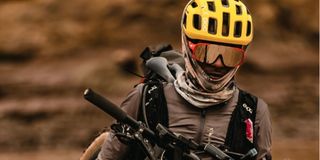The trials and triumphs of a budding off-road cyclist

What you need to know:
- Kenneth Karaya, 27, is a professional cyclist who mainly competes in gravel and mountain bike races
- Kenneth, who started cycling while in high school, has grown to become one of Kenya’s most consistent off-road cyclist
- The second-born in a family of four features for Iten-based Team Amani
Kenneth Karaya, 27, is a professional cyclist who mainly competes in gravel and mountain bike races. He started cycling while in high school, has grown to become one of Kenya’s most consistent off-road cyclist
You are the first Kenyan to make it to the podium at an ultra-cycling race. Tell us more about this…
One of the reasons I chose to do ultra-racing is because my slender body is suited for long distances, riding in different weather conditions and going for long distances with little food. The success of Kenyan long distance runners gives me confidence to confidently pursue this passion.
I also like that long distances give me more time with myself. You ride almost all day and all night. You get to see different countries and all the beautiful scenery along the route. I enjoy riding solo, stopping to eat different foods and interacting with locals.
I like to push my limits both mentally and physically. The lack of sleep, fatigue and long hours on the bike takes you into a different head space that you can only experience during an ultra-race.
Why do you do ultra-cycling?
I do it to show people that everything is possible. I want to inspire people to take on long distance events and show the world that Kenyans can be triumphant in these competitions. I believe I can win these races and create a lasting legacy for Kenyan cycling. I am hoping to build on my racing knowledge and improve my performances.
My first ultra-race was Race Around Rwanda in 2023. I finished second in the 1,000 kilometres race in a time of 56 hours and 11 minutes. My goal this year is to win the Race Around Rwanda in February and improve my time.
What is the difference between ultra-racing and other forms of riding competitions?
The distances in ultra-racing are longer, and take more than a day. There is also less pressure on cyclists because you have more time. If you are organised, have the right equipment and know how to manage your time, you will succeed. It is different from short distance racing where things are quick and calculated, and one mechanical problem can get you out of the competition. Ultra cycling is more of an adventure. You get to see different places and experience things on a different level.
Tell us how this cycling journey started…
Previously, I was a track athlete specialising in long-distance running. I did this in primary school and even in my first year in high school. I switched to cycling when I was in Form Two. I was inspired by my uncle Stephen Gituku who used to compete with a Black Mamba bike. He did a few competitions in his days and used to cycle to and from work. I started my cycling career with a similar bike worth about Sh3,000 in 2012. I sharpened my skills when I joined the cycling group, Safari Simbas, where I also learned to be a bicycle mechanic.
What challenges have you encountered in your journey?
Lack of sponsorship almost made me quit just before the Covid-19 outbreak. It had been seven years and I had not seen any benefits. Just when I was about to give up, in 2021, help came my way in the form of Australian professional gravel and road racing cyclist Lachlan Morton. He was looking to partner with someone from Kenya for the annual mountain bike stage race – Cape Epic in South Africa – after his partner Alex Howes broke his thumb two weeks before the race. Mikel Delegrange, who is the manager of Team Amani, suggested my name to Morton and I accepted the challenge.
The experience in South Africa changed my mind completely. I came back very energised. Before Lachlan came through, I had lost my business. I had employed 10 bodabodas, but the business took a hit in 2020 and got worse after the pandemic. We did the race with Lachlan in October 2021 and that is when I realised the doors of cycling are not yet closed for me.
Tell us briefly about your journey with Team Amani...
I joined the team in 2022 and so far it has been a wonderful journey. Team Amani aims to turn East Africa into a cycling powerhouse. They help with equipment, race registration, travel and nutrition. I have signed a professional contract with Team Amani, renewable every year depending on performance. In the contract, I get a monthly allowance.
Who inspires you in this sport?
Australian Lachlan Morton is my role model. I had been watching him on YouTube to get tips about cycling even before we met. He has continued to help me with training programmes and advice.
Why do you like cycling so much?
I have travelled abroad and to many parts of Kenya courtesy of this sport, and made a lot of connections. I have constructed a good house from my earnings, employed 30 bodaboda riders and opened a shop for bicycle spare parts. I have helped eight boys to nurture their cycling talents.





